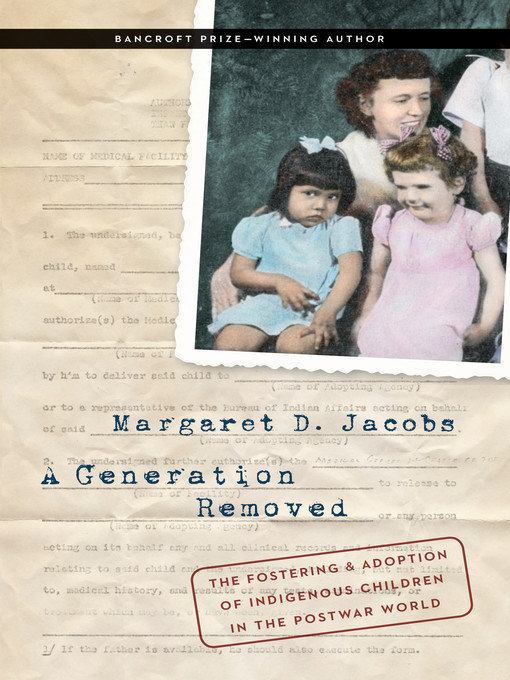A Generation Removed
The Fostering and Adoption of Indigenous Children in the Postwar World
-
Creators
-
Publisher
-
Release date
September 1, 2014 -
Formats
-
Kindle Book
-
OverDrive Read
- ISBN: 9780803276567
-
EPUB ebook
- ISBN: 9780803276567
- File size: 3767 KB
-
-
Languages
- English
-
Reviews
-
Kirkus
August 15, 2014
Little-known story of the forcible removal of American Indian children in the 1960s and '70s. In this nuanced, scholarly work, Bancroft Prize winner Jacobs (History/Univ. of Nebraska; White Mother to a Dark Race: Settler Colonialism, Maternalism, and the Removal of Indigenous Children in the American West and Australia, 1880-1940, 2009, etc.) describes how government authorities took thousands of American Indian children away from their families, acting on the prevalent notion that Indian families were unfit to raise children. With no evidence of neglect required, the children were institutionalized, fostered or adopted in non-Indian homes. Officials claimed to be acting in "the best interests of the child," while critics charged that social workers and court officials were using "ethnocentric and middle-class criteria" to remove children unnecessarily. In fact, writes the author, the removals were acts of cost-cutting disguised as caring: Neither federal nor state governments had to fund the care of American Indian children once private families adopted them. For officials in the Bureau of Indian Affairs, private adoptive homes solved "the Indian problem of persistent dependence on the federal government." For Indian families, the results were devastating and traumatic. Moreover, extended Indian families customarily helped care for tribal children, including those of unwed mothers. Jacobs recounts the thinking of bureaucrats, the polarizing debates among psychologists and social workers, and earlier federal attempts to assimilate Native American children, most notably by sending them to boarding schools known for their corporal punishment. Child removal ended with the passage of the Indian Child Welfare Act in 1978, which affirmed tribes' sovereignty over most such matters. In Canada and Australia, similar treatment of indigenous children triggered public discussion and government apologies, while the U.S. government has ignored the issue. A solid account that calls for "a full historical reckoning" of this devastating chapter in the treatment of Native Americans.COPYRIGHT(2014) Kirkus Reviews, ALL RIGHTS RESERVED.
-
Formats
- Kindle Book
- OverDrive Read
- EPUB ebook
subjects
Languages
- English
Loading
Why is availability limited?
×Availability can change throughout the month based on the library's budget. You can still place a hold on the title, and your hold will be automatically filled as soon as the title is available again.
The Kindle Book format for this title is not supported on:
×Read-along ebook
×The OverDrive Read format of this ebook has professional narration that plays while you read in your browser. Learn more here.

